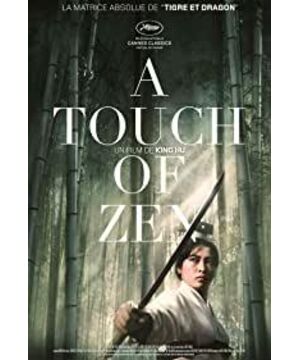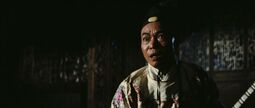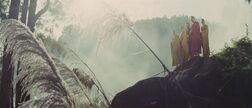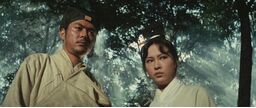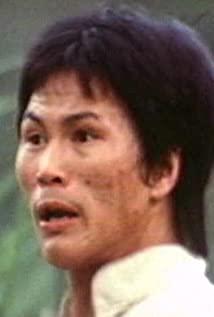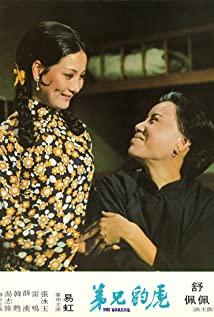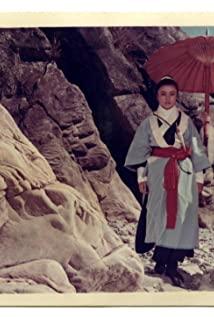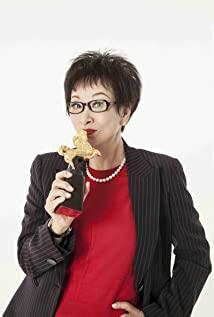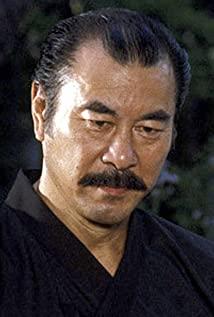Most of this article discusses the narrative text layer of Director Hu's films, and the poetic imagery that Director Hu focuses on and the most outstanding is not discussed, nor is it intended to be praised, just some personal opinions.
Occasionally it happens in movies that what the picture presents is completely different from what the text layer expresses, where the text is the context and overview of the story, while the picture is the detailed expression, the actual presentation. In philosopher Žižek's famous analysis of the film The Sound of Music, The Sound of Music is an anti-Nazi Austrian film, but its portrayal of the Austrian nation is fascist. , speaking in dialect and wearing an almost unsightly local national costume, this image is precisely a small but beautiful brutish fascist. And the Nazi officers wore well-fitted uniforms, dainty beards, and expensive luxuries, almost a typical image of a degenerate Jew. So on the text level, the film is an anti-Nazi film, and on the image presentation, it is the story of a fascist resisting degenerate capitalism. While the film ostensibly agrees with democratic ideology, it also points out hidden fascist dreams.
In Hu Jinquan's films, there is actually such a conflict between the picture layer and the text layer, which is reflected in the inner conflict between the poetic picture and the martial arts text. The poetic empty shot is in contrast to the narrative shot. At the textual level, the film is often metaphysical, but the poetic image is a metaphysical situation. In the usual comments, this kind of conflict and violation is said to be an expression of irony. For example, at the beginning of "Empty Mountain and Spiritual Rain", three people with different hearts travel to the temple in a beautiful environment, but this kind of The situation is not a kind of separation of poetic image and narrative lens. This article is divided into three parts, as an introduction to the poetic picture of the imported oriental artistic conception, summarizing the conflicts and innovations in the formalized martial arts texts of the early style, and the poetic pictures and the martial arts texts mainly involved in the later films, focusing on the analysis. conflict.
The Poetic Picture of Oriental Artistic Conception
Hu Jinquan is actually the first author-director in my country to become famous in the international film circle. He was named one of the top five directors in the world by the British "International Film Guide" in 1978. In terms of film culture, Hu Jinquan's films It is full of Chinese elements, with landscape paintings in the scenery, humanistic paintings in the form, Confucianism, Buddhism and Taoism as the gods, and promotes Chinese aesthetics and spiritual culture.
Hu Jinquan is a typical conscious pursuer of Chinese classical aesthetics. He was born in a scholarly family since childhood. Under the influence of the painter's mother, Hu Jinquan has a good art foundation and Chinese classical art aesthetics. In his works, a large number of landscapes are reflected in the film, and the characters walk among the mountains and rivers, with a unique classical freehand style, which enables the audience to deeply appreciate the prudent charm of the fusion of painting art and film, reflecting the excellent Compositional scene art skills.
In Hu Jinquan's early WTO entry and loyal martial arts films "Drunken Man" and "Dragon Inn", the scenes are set in a single-room inn in the desert. It is a turbulent situation, and the forces of all parties are grouped and fighting with each other. In addition, the inn is the place where the conflict occurs, and the artistic conception and the storyline mirror each other.
In the detached Zen Buddhist films "Empty Mountain Spirit Rain" and "Legend in the Mountains", the sparsely sloping and sloping monasteries, the lofty mountains and the gurgling forests embody a kind of landscape charm and extraordinary spirituality. Empty, wide and high create a borderless aesthetic space. Especially in "The Legend of the Mountains", He Yunqing walks among the mountains and forests for the first 20 minutes of the film. Every shot is as elegant and delicate as a landscape poem and painting, sublimating the detachment in an abstract aesthetic sense. ideal yearning.
In addition, a large amount of smoke is also the top priority of Hu Jinquan's films. Before the Chinese aesthetic term "artistic conception" was produced, Xie He proposed the painting "Rhyme and Dynamic" as early as during the Dibu Dynasty. The basic aesthetic principle of "Qi Yun" originated from Taoism. So in this kind of "qiyun", it appears as smoke. The fog is both a barrier and a Taoist machine, shrouding the space of the film in a daze and uncertainty. In "Dragon Inn", the fog is a preview before the bloody storm, with a mysterious meaning that the result is unknown. In "Empty Mountain and Spiritual Rain", it conveys the atmosphere that everyone is in the game and does not know each other's intentions. But more often, such as "The Legend of the Mountain", fog, as an aesthetic need and a plot need, smudges out the dark and classical beauty, becomes a blank space in the film, and drives the mysterious artistic conception. The scene of the flute is represented: Evian plays the flute in white clothes and faces the water in the haze of clouds and smoke, and the sunlight scatters through the mist into a chaotic halo, which has an ethereal charm, revealing the fairy air from the dust.
Light is another important aspect of Hu Jinquan's films. The use of light in "Chivalrous Girl" is a masterpiece. In the decisive battle in the bamboo forest, the light passes through the fog and the bamboo forest to form a light curtain, conveying an ethereal artistic conception, which almost makes people forget what happened in the movie. In the final battle in the desert, the monk was wounded and passed away. He slowly took a seat on the top of the mountain. A round of red sun was rising. Light, as a natural image, here represents the escape from life and death, the disdain of the world, and the return to the realm of transformation.
All in all, in Hu Jinquan's films, we can see the Taoist aesthetic of "harmony between man and nature", so in the film, knights and Confucian scholars either come from the vast desert, or from the strange pines and green cypresses, Or cross the river and cross the mountains, and finally disappear into the natural landscape of these thousands of miles. There is also the aesthetic interest of "Tao is natural". For example, in "Chivalrous Girl", the water lilies in the water after the rain is the meaning of tying the knot. In "Empty Mountain and Spiritual Rain", Elder Zhiyan and his disciples are among the flowers. Zen meditation, enlightenment under the forest, blending with the scene.
Conflict and Pioneering in Formalized Wuxia Texts
In Hu Jinquan's early martial arts movie scripts, the plots were developed in the small garden spaces such as inns, temples, etc., and some artistic techniques of drama were used to present the mutual exploration of several groups of people in the closed space. , begins the final battle, and then the righteous side wins.
In the early stages of such films, the plot is often fascinating, and the audience is still unfamiliar with the characters. The appearance of the characters is based on the actual appearance of the drama tradition, placing the main characters in the center of the camera, and the villain and supporting characters provoke troubles, and the main characters solve the trouble. In the middle, the main character characteristics, strength and attitude of the characters are shown, as well as false appearances. Through the secondary characters discussing what they have done before the main characters appear, the audience can understand the characters before they appear, and improve the understanding of the characters. Interests and sensitivities of the character.
After that, we will enter the trial stage, adopting the method of flat drama in the drama. The strengths of all parties compete with each other in the Hakoniwa space of the inn or temple, obtain each other's information, formulate strategies, and lay the groundwork for the subsequent thorough decisive battle. At the same time, due to the The unique style of Pingju does not deliberately belittle the villain. The tension of the plot is highlighted again and again, and the "controversy" of the Pingju drama can be seen here, which makes the struggle between the two sides fierce and highly enjoyable to watch. For example, in "Dragon Gate Inn", the agents of the East Factory and the righteous warriors have a battle of wits and wits, and in "The Storm in the Yingchun Pavilion", the Mongolian prince Richard and the anti-Yuan patriots are in a battle of wits and courage around the Tibetan soldier map. During these tentative sessions, the story progresses in one climax after another until there is no way the two sides can start to go head to head.
When the battle is short-handed, usually when the decisive battle is about to leave the inn, the story begins to go downhill, and there is a problem. First of all, the original main goal has become a secondary goal in the film, and the results of the battle of wits have also turned into nothing. , became the main goal of killing the opponent. Moreover, due to the serious masking of characters in such films and the rigid drama routines, although the martial arts scenes are remarkable, the decency will definitely defeat the villains, win the game, and then wipe out the villains. And due to the facial features of the characters, it is conceivable which characters sacrificed. For example, the two Tatars who surrendered in "Dragon Inn" acted as supplementary explanations for the plot to compete with combat power. It is conceivable that they would sacrifice Yes, because the characters who do not belong to the protagonist group. In the first half of "The Storm in the Yingchun Pavilion", the power and strength of the Mongolian prince Richard and others were exaggerated. However, when they faced each other, they seemed so fragile and fell into the stereotyped ending of the villain's death.
Moreover, these martial arts films often have some groundbreaking fantasy properties, some are inherited from martial arts novels, and some are personal originals, such as the eunuch martial arts in "Dragon Inn", which makes a good sword and heroic spirit, insisting There are many people in the protagonist group, and the county master in "The Storm in the Yingchun Pavilion" is superb in martial arts, pungent and decisive, and kills without blinking an eye. Master Hui Yuan, who is the number one in the world in martial arts and unparalleled in "Chivalrous Girl". These unique creations have influenced the character settings in the later martial arts films, and have a unique image charm.
At the same time, the film also has an idealized nature when it pursues a realistic literati martial arts film. In "Dragon Inn", if the protagonist group has less than eight people, they will wipe out the agents of the East Factory, and these agents are at the beginning of the film, in order to set off them The organization and combat effectiveness of the team also arranged the plot that they would garrison the guards cruelly. When the eunuch Cao Shaoqin brought people to chase and kill him, not to mention that Cao Shaoqin went into battle in person, the most obvious problem in the plot was that he brought too few people. At this time, Cao Shaoqin should bring a large number of people to surround the protagonist group. It can be justified by saying that Cao Shaoqin believes that he is strong in martial arts and does not need help, but in the end, there are too many people who survived the protagonist group after the final killing, which also makes the film seem too idealistic. The action scenes are realistic, but the script is not. is ideal. This idealized quality is particularly prominent in "The Storm in Yingchun Pavilion". The final battle is extremely abrupt, like a violent fault. First, the little pepper was found when he returned the letter and was decisively killed by the county master. He directly turned his face and entered the deathmatch. The original foreshadowing was ineffective, and then Prince Richard gave up the advantages of indoor personnel and his identity as a knife master in the film, and fled outdoors, resulting in people being divided and killed, which seemed absurd and unreasonable. In particular, the prince has established such a sensible, resourceful and courageous image in front of him. Moreover, Shen Tiansong's sales of soldiers' maps are actually single-handedly. Also a problem.
In addition, in this formalized martial arts film, the portrayal of Pingju makes the facial expressions of the characters internally form a contradiction and tension. On the one hand, in the film, it is established that the right and the wrong are divided, such as the West Factory spy in "Dragon Inn". The eunuchs and eunuchs are bad people. The group of knights organized for the sake of Zhongliang is good people. In "The Storm in Yingchun Pavilion", the anti-yuan fighters headed by the lady of Yingchun Pavilion are good people. is the bad guy. On the other hand, the portrayal of the characters in the movie makes this distinction between good and evil become blurred. In fact, this blurring starts from the beginning of the movie. The beginning of the movie will outline the background of the story, but this background is not important to the big picture. Part of the audience is vague, but left behind when the story begins to unfold. Then there is the problem of detailed character characterization. In "Dragon Inn", this problem is not too serious, and the opposition between good and evil is obvious. Except for a set of rhetoric of the big stall, the Dongchang spy is described as a victim of the bureaucratic system. I don't want to do bad things myself, I just can't help but eat. In the end, because the big eunuch did not have a foreshadowing, he suddenly appeared on the stage, and he had more than one enemy, and he was somewhat heroic. The problems caused by this kind of character portrayal in "The Storm in the Yingchun Pavilion" have become much more serious, and it is worth discussing in detail.
On the surface, "Storm in the Yingchun Pavilion" is a story of a battle of wits and courage with the Mongolian prince Richard Han. If you don’t put yourself on the side of justice first, but look inward, the proprietress of Yingchun Pavilion is a prostitute-like figure who has an affair with the local official Duoluhuachi Halegu. They are three sects and nine-tiered, either snitch or mountain bandit. They all have bad backgrounds, and they all have some bad habits, or their attitude is bullying, or they are petty theft. As for the helpers who came, one was the image of a beggar who sang a song, and the other was the image of a somewhat reckless knight, both of which could not get into the lobby, and both had a bit of evil spirit. On the other hand, looking at the image of the prince and the county master, as the senior rulers of the bureaucratic organization, they are generous, nobles pretending to be well-informed, strict and just. He did not begrudge the inn's reward, and he could appreciate Yuanqu, as if they were two Confucian cultural elites.
If we ignore the main axis of the story, about the story of the anti-yuan and the soldiers, we see something similar to the "Sound of Music" happening here, the anti-yuan fighters are the new power contenders from the bottom of the class, wang ye The county owner represents the elite upper class. We can even get such an interpretation. On the surface, this film is a patriotic story of an anti-Yuan fighter against the Yuan army, but secretly it caters to the dream of the lower class to replace the upper class. .
The Conflict of Poetic Picture and Wuxia Text
Hu Jinquan began to add a lot of empty scenes of poetic pictures from "Chivalrous Girl", changed the original way of presentation of the film, added a lot of Buddhist Zen elements, and began to adapt the original classic novels and stories. Some stories are no longer limited to the inn. Like a box garden space, and walked into the temple between the mountains and forests. In these poetic pictures, the idealized martial arts texts are separated and contradictory with the poetic pictures.
The contradiction of "Chivalrous Girl" lies in the conflict between the poetic images of Buddhist elements and the text of martial arts elements. Master Huiyuan, who plays an important role in the film, is a representative of Buddhism, with strong martial arts skills and ingenious calculations. Confucian spirit and chivalrous temperament. At the beginning of the film, he stopped the Dongchang people who wanted to attack the chivalrous woman and protected them. This is called Lu Jianbuping to help and protect Zhongliang. Afterwards, the Xia Nv and the others wanted to be slaughtered, become a Buddha, and live a quiet life, but he refused, saying that there was no fate in the world, what was the fate of the world, to avenge the father and kill the adulterer. After killing the traitor, returning to the temple, and handing the child over to the scholar, if this film ends here, at least the mood is high. But a paragraph was added at the back. The scholar was in trouble. Master Huiyuan said that the vulgar fate was not over. He helped him with a journey, and he killed him again. In the end, he could not beat the master. , was finally plotted, the people around him died, and he turned into a golden Buddha, pointing the chivalrous woman to the west. Here we can see the form of Buddhism, but not the god of Buddhism. Master Huiyuan did not kill himself, but every time he gave instructions to chivalrous women in the film, he would lose a few lives in the world. Like a chivalrous person, after protecting the loyal chivalrous girl, she will be safe, but she will not care about the fate of others.
In addition, the most outstanding and least needed plot in the film is at the beginning of the bamboo forest, Jin Yiwei was forced to retreat by Master Huiyuan, and then in the Gobi, he surrendered, and Master Huiyuan was seriously injured and turned into a golden Buddha. This perfectly highlights the conflict between the martial arts text and the poetic picture.
The first is the lack of Buddhist principles. In this episode, Master Huiyuan used force to force him back. Except for scolding, there was no persuasion, no reasoning, and no wisdom.
The second is the violation of the plot. The image of Master Huiyuan was a prophet in the early stage of the movie, and he had a clever plan, but it was easy to believe that after Jin Yiwei had beaten someone with the front foot, he figured it out with the back foot and wanted to be born.
The third is that evil is always evil, and the villain is always the villain, who only believes in force, not Buddhism, and never regrets it.
Fourth, when Huiyuan became the righteous way, there was a corpse in the ground, and everyone around him died because of his negligence, but at this moment, Huiyuan obtained the way and died.
Among them, the lack of Buddhist theory is also reflected in "Empty Mountain Lingyu" and "Legend in the Mountains". In "Empty Mountain Lingyu", the plots of Zen theory or comprehension of Zen theory are all about the nature of watching flowers, and the words are empty. In "The Legend of the Mountains", the monk Fan always reprimanded Le Niang for his words, using force to threaten, which was impersonal, and felt less human than a ghost.
Evil is always evil, except for the female Snitch in "Empty Mountain and Lingyu" who repented, all the others were also evil, and there was no repentance, and some people even fell off a cliff and died because of it. In "The Legend of the Mountain", Le Niang also repeated a fraudulent surrender, which made people feel emotionless.
"Empty Mountain and Spiritual Rain" is a structured and formalized text in the first place. The temple itself is a clean place, but in the end it becomes a place where various forces gather and entangle like an inn. The general plot of the movie is that the abbot of Sanbao Temple, as the mantle and mantle, invited the wealthy businessman Wen An , General Wang to discuss with the monk Wuwai. The eldest disciple, Huitong, and the second disciple, Huiwen, colluded with General Wang and Wen'an respectively to gain the position of abbot. At the same time, General Wen'an has been coveting the manuscript of the Tang Dynasty Sanzang Master 's Book of Revelation of Faith in the temple . At this time, the prisoner Qiu Ming bought the ultimatum and was about to shave his hair to become a monk. He was also involved in this storm. A story of open and secret fighting and intrigue between them .
Due to the formalized text, after basically watching the front in the film, you can guess what will happen later. Qiu Ming will definitely be the abbot, and the conspiracy of other people will be foiled. What is emphasized in the film is also the struggle between various forces. It can be said that the actual film has some meaning of catching turtles in the plot design. In the setting, there are people who have realized the Tao, insight into the world, and easily break the conspiracy of the other two forces. In fact, there are inherent contradictions in such a design. The enlightened people are actually willing to play this conspiracy and tricks with the lay people, instead of breaking through and persuading them, and finally causing Wen An to fall off a cliff and die. This passage can be said to be a lack of Buddhist philosophy. It is also a necessity of formalized texts. If someone symbolizes excessive desire, it will destroy itself. But in terms of this desire, the temple has become a decoration. Except for a few roles, this temple has no Buddha. It is a field of desire. Everyone is greedy for power. The roles that symbolize Buddhist principles are empty and tangible, but in fact there is no god, either a pragmatic manager, such as the abbot, or a mediocre person who is bound by superficial Buddhist principles, such as the third junior brother, and Qiu Ming is both. comprehensive. The Zen allusions used in the movie, you can say that he is truthful, but you cannot deny that this truthfulness is clumsy.
In addition, there are very few scenes of chanting Buddhist scriptures in this film, and most of the dialogues of the characters have nothing to do with Buddhism and are all mundane things. The sermon of the lay Buddhist monk Wuwai is not so much a demonstration of Buddhist principles, but rather a demonstration that these monks are mediocre, and each of them will peek at the maids, which further confirms that the monks in this temple are only physical, and they will be easily taken down later. Incitement, rioting over food.
The characters in this film are also almost flat due to the formalized text, and their characters have not been developed in the film. For example, Qiu Ming, the most important character, was almost a man of the Tao when he appeared on the stage. He was neither humble nor arrogant, hardworking, willing to let go, and not close to women, but he was not yet shaved.
What elevates the realm of the film is the plot of Qiu Ming burning the scripture that caused the calamity in "The Awakening of Faith in the Mahayana ", expressing the desirelessness and emptiness of Buddhism, but this solution can be viewed from another level. It's rude, and if something is causing a problem, we'll just get rid of it.
On the whole, we can indeed see a lot of Zen Buddhist allusions in the movie, but the main plot of the movie is wandering between plots and desires. Buddhism is a solution, but it has nothing to do with the laity. The villain in the film Except for the female snitch, all of them have no connection with the Buddha. There are Huitong and Huiwen who have practiced Buddhism for many years and still admire power like a layman, General Wen'an who has come to the temple to practice meditation many times, and a large number of monks in the temple. Form and insufficiency, all of which have created a gap with the poetic picture in the film.
View more about A Touch of Zen reviews


